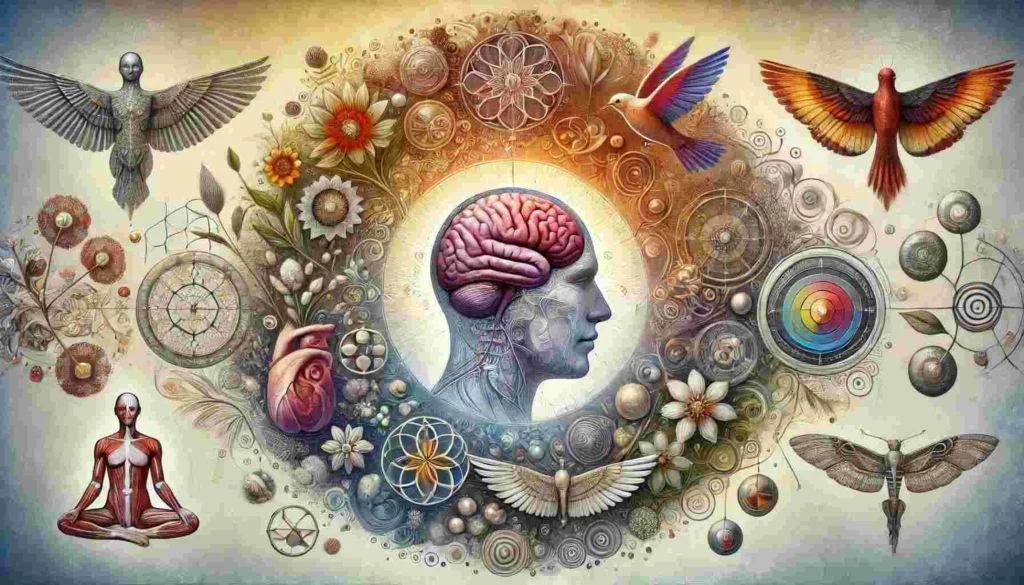
Holistic Psychology: Integrating Mind, Body, and Spirit
Introduction to Holistic Psychology
Holistic psychology offers a transformative approach to mental health and well-being. Unlike traditional psychological practices that focus solely on thoughts and emotions, holistic psychology addresses the interconnectedness of the mind, body, and spirit. This approach aims to identify and treat the root causes of issues rather than just alleviating symptoms.
Understanding the Core Principles of Holistic Psychology
Mind-Body Connection
Holistic psychology emphasizes the deep connection between the mind and body. Your thoughts and emotions directly affect your physical health, and physical conditions influence your mental state. For example, chronic stress often leads to issues like high blood pressure or digestive problems. Likewise, physical ailments such as chronic pain can cause anxiety or depression.
By adopting practices like mindfulness, yoga, and meditation, individuals can bridge the gap between their mental and physical health. These practices help regulate emotions, reduce stress, and promote overall well-being.
The Role of Spirituality in Healing
Spirituality plays a crucial role in holistic psychology. It doesn’t necessarily involve religious beliefs but focuses on a sense of purpose, connection, and inner peace. Spiritual practices like meditation, journaling, or spending time in nature can foster spiritual well-being. Many people find that nurturing their spirit provides grounding and helps them handle life’s challenges more effectively.
Benefits of a Holistic Approach
Comprehensive Care
Holistic psychology provides care that addresses every aspect of a person’s life—mental, physical, and spiritual. This comprehensive approach often leads to more sustainable healing and lasting well-being.
Personalized Treatment Plans
Since no two individuals are the same, holistic psychology tailors treatments to meet unique needs. For instance, a therapist might combine cognitive-behavioral therapy (CBT) with acupuncture or pair counseling sessions with nutritional guidance. This flexibility ensures that each person receives care that resonates with their specific situation.
Promotes Self-Empowerment
Holistic psychology empowers individuals to take control of their healing journey. By learning tools like mindfulness, breathing exercises, and nutrition practices, people can cultivate self-awareness and independence. This empowerment helps them navigate life’s challenges with confidence.
Key Holistic Practices for Mind, Body, and Spirit
Mindfulness Meditation
Mindfulness meditation remains a cornerstone of holistic psychology. This practice encourages individuals to focus on the present moment without judgment. Consistent mindfulness practice improves mental clarity, emotional regulation, and physical health.
- Getting Started: Spend 5-10 minutes each day focusing on your breath. Sit comfortably, close your eyes, and notice each inhale and exhale. This simple practice can lower blood pressure, reduce anxiety, and enhance overall well-being.
Yoga and Movement Therapy
Yoga offers more than just physical exercise; it promotes mental, physical, and spiritual balance. By combining movement, breath control, and meditation, yoga helps reduce stress and improve flexibility and strength.
- Recommended Poses: Try Child’s Pose to relax your body, Downward Dog to stretch, and Warrior Pose to build strength and focus. Movement therapies like dance or tai chi also help release emotional tension and foster self-expression.
Nutritional Psychology
The food you eat significantly influences your mental health. Nutritional psychology explores how diet affects mood, energy levels, and brain function. Consuming nutrient-rich foods supports emotional stability and cognitive performance.
- Healthy Choices: Incorporate omega-3 fatty acids found in fish, flaxseeds, and walnuts to reduce depression symptoms. Whole grains help stabilize mood by maintaining blood sugar levels. Avoid processed foods, which can negatively impact mental health.
Energy Healing Modalities
Energy healing techniques like Reiki, acupuncture, and chakra balancing aim to restore the body’s natural energy flow. These practices address emotional and physical imbalances that may not be immediately obvious.
- How to Begin: Schedule a session with a certified Reiki practitioner or acupuncturist. Many people report feeling lighter, calmer, and more balanced after energy healing sessions.
The Science Behind Holistic Psychology
Although holistic psychology incorporates ancient wisdom, modern science supports many of its practices. Research on mindfulness meditation shows that it changes brain structure, increasing gray matter density in areas responsible for learning, memory, and emotional regulation.
Studies on yoga demonstrate its effectiveness in reducing anxiety and depression while improving heart rate variability and physical flexibility. Nutritional research also reveals that a balanced diet enhances mental clarity and emotional well-being.
Practical Steps to Integrate Holistic Psychology into Daily Life
Holistic psychology doesn’t require dramatic lifestyle changes. By incorporating small, mindful practices, you can consistently nurture your mind, body, and spirit. Here are actionable ways to integrate holistic principles into your everyday routine.
Start a Mindfulness Practice
Mindfulness is one of the most accessible tools for promoting holistic well-being. You don’t need special equipment or lengthy sessions to begin. Even a few minutes can have a noticeable impact.
- Morning Mindfulness: Spend five minutes each morning focusing on your breath. Breathe deeply and observe each inhale and exhale. This helps you start your day with a sense of calm and clarity.
- Mindful Eating: Pay attention to the flavors, textures, and aromas of your food. Chew slowly and avoid distractions like phones or TV. This practice improves digestion and prevents overeating.
Incorporate Daily Movement
Physical movement is essential for balancing the mind and body. Exercise doesn’t just improve fitness; it helps release emotional tension and boosts mental clarity.
- Yoga Sessions: Dedicate 15 minutes to yoga each morning or evening. Poses like Child’s Pose, Downward Dog, and Warrior help stretch and strengthen your body while calming your mind.
- Walking Meditation: Take a 20-minute walk in a natural setting. Focus on your breath, the rhythm of your steps, and the sounds around you. This practice reduces stress and anchors you in the present moment.
Prioritize Rest and Sleep
Rest and quality sleep are vital for overall well-being. Inadequate sleep can affect emotional stability, cognitive function, and physical health.
- Bedtime Routine: Establish a calming bedtime routine by reading a book, dimming the lights, or practicing a short meditation. Avoid screens for at least an hour before sleep.
- Optimize Your Sleep Environment: Make your bedroom cool, dark, and quiet. Use blackout curtains, a white noise machine, or earplugs to block out disruptions.
Holistic Therapy Techniques for Mind, Body, and Spirit
Holistic psychology offers diverse therapeutic methods that address every aspect of your well-being. These techniques go beyond traditional therapy by integrating physical and spiritual healing.
Holistic Cognitive Behavioral Therapy (CBT)
Holistic CBT combines traditional cognitive-behavioral techniques with mindfulness, meditation, and physical practices. This approach helps address both mental and physical symptoms.
For instance, if you struggle with anxiety, a therapist might pair thought-challenging exercises with breathing techniques and visualization. This combination helps calm both your mind and body.
Reiki and Energy Healing
Reiki focuses on restoring balance to your body’s energy fields. Practitioners use gentle hand placements to channel energy, helping release emotional blockages and promote relaxation.
Many individuals report feeling warmth, peace, and emotional release during Reiki sessions. This therapy works well alongside traditional treatments to address deeper imbalances.
Breathwork Therapy
Breathwork involves specific breathing exercises to reduce stress and improve emotional health. Techniques like diaphragmatic breathing, box breathing, and alternate nostril breathing are simple yet effective.
Regular breathwork can lower anxiety, improve sleep quality, and boost energy. It’s a flexible tool you can practice anywhere, anytime.
Building Emotional Resilience Through Holistic Practices
Emotional resilience allows you to recover from challenges more effectively. Holistic practices strengthen this resilience by addressing the mind, body, and spirit.
Gratitude Practices
Gratitude helps shift your perspective from negativity to positivity. By practicing gratitude regularly, you can improve your mood and build emotional strength.
- Daily Gratitude Journal: Write down three things you’re grateful for each day. Reflect on why each item is meaningful to you. This habit fosters positivity and resilience.
Affirmations and Positive Self-Talk
Positive affirmations can help replace negative thought patterns with empowering beliefs. The way you speak to yourself shapes your emotional health.
- Examples of Affirmations: “I am capable of overcoming challenges,” “I choose peace and joy,” or “I am worthy of love and happiness.” Repeat these daily to cultivate a more positive mindset.
Connect with Nature
Spending time in nature offers a therapeutic escape from daily stressors. Nature promotes mental clarity, emotional balance, and spiritual connection.
- Forest Bathing: Try Shinrin-yoku, a Japanese practice that involves immersing yourself in a forest environment. Focus on your senses—smell the fresh air, listen to the rustling leaves, and feel the ground beneath your feet. This practice lowers stress and enhances well-being.
The Growing Role of Holistic Psychology in Modern Healthcare
Holistic psychology is gaining recognition in mainstream healthcare as more people understand the mind-body connection. Professionals are increasingly blending holistic practices with traditional therapies.
Integrative Health Clinics
Many clinics now offer a combination of traditional therapy, yoga, acupuncture, and nutritional counseling. This integrative approach addresses the whole person, leading to more effective and sustainable healing.
Evidence-Based Research
Scientific studies continue to validate holistic practices. Research shows that mindfulness, yoga, and energy healing can reduce anxiety, depression, and chronic pain. These findings encourage more mental health professionals to adopt holistic methods. Practical Steps to Integrate Holistic Psychology into Daily Life
Holistic psychology can become part of your everyday routine with a few simple practices. By incorporating these steps, you can nurture your mind, body, and spirit consistently. Here are actionable ways to integrate holistic principles into your life.
Start a Mindfulness Practice
Mindfulness is one of the easiest and most effective ways to connect with the present moment. It doesn’t require special tools or long hours. Instead, short, focused sessions can make a big impact.
- Morning Mindfulness: Spend 5 minutes each morning focusing on your breath. Take deep breaths, and pay attention to each inhale and exhale. This simple exercise sets a calm tone for the day.
- Mindful Eating: Focus on the flavors, textures, and smells of your food. Avoid distractions like phones or TV while eating. Practicing mindful eating helps with digestion and reduces overeating.
Regular mindfulness practice can improve concentration, reduce anxiety, and strengthen your mind-body connection.
Incorporate Daily Movement
Exercise is not just for physical fitness; it plays a key role in mental and emotional health as well. Movement helps release emotional energy, improves clarity, and enhances spiritual balance.
- Yoga Flow: A 15-minute yoga session in the morning or evening can stretch your body and calm your mind. Poses like Child’s Pose, Downward Dog, and Warrior are great for flexibility and strength.
- Walking Meditation: Take a 20-minute walk in nature. Focus on your steps, your breathing, and the sounds around you. This mindful practice reduces stress and connects you to the present moment.
Prioritize Rest and Sleep Hygiene
Rest and sleep are essential for holistic well-being. Poor sleep affects your emotional balance, cognitive function, and physical health. To improve your sleep quality, consider the following strategies:
- Create a Bedtime Routine: Wind down by dimming the lights, reading a book, or doing a short meditation. Avoid screens at least an hour before bed.
- Optimize Your Sleep Environment: Make your bedroom dark, quiet, and cool. Use blackout curtains, earplugs, or a white noise machine if necessary.
A consistent sleep routine helps reset your body and mind, promoting emotional balance and resilience.
Holistic Therapy Techniques for Mind, Body, and Spirit
Holistic psychology incorporates diverse therapeutic techniques that address the whole person. These methods cater to mental, physical, and spiritual well-being. Here are some popular holistic therapies that promote integrative healing.
Holistic Cognitive Behavioral Therapy (CBT)
While traditional CBT focuses on thoughts and behaviors, holistic CBT integrates mindfulness, meditation, and physical practices. This combination addresses both emotional and physical symptoms.
For example, if someone struggles with anxiety, a therapist might combine thought-challenging exercises with breathwork and visualization. This approach calms the mind and body simultaneously.
Reiki and Energy Healing
Reiki focuses on balancing the body’s energy fields to promote relaxation and release emotional blockages. During a session, a practitioner gently places their hands over specific areas to channel healing energy.
Many people experience warmth, calm, and emotional release. Reiki complements traditional therapies by addressing imbalances that aren’t immediately visible but deeply felt.
Breathwork Therapy
Breathwork is a powerful tool for managing stress and enhancing emotional health. Techniques such as diaphragmatic breathing and alternate nostril breathing promote relaxation and mental clarity.
Regular breathwork can help reduce anxiety, improve sleep, and boost energy levels. Best of all, you can practice it anywhere and anytime.
Building Emotional Resilience Through Holistic Practices
Emotional resilience is the ability to recover from challenges. Holistic psychology offers strategies that strengthen this resilience by nurturing your mind, body, and spirit.
Gratitude Practices
Gratitude helps shift your focus from what’s wrong to what’s going well. Incorporating gratitude into your daily routine can improve your mood and outlook on life.
- Gratitude Journaling: Write down three things you’re grateful for each day. Reflect on why they matter to you. This practice enhances positivity and fosters resilience.
Affirmations and Positive Self-Talk
The way you speak to yourself influences your emotional well-being. Positive affirmations can replace negative thought patterns with empowering beliefs.
Examples of affirmations include, “I am strong and capable,” “I trust my journey,” or “I am worthy of peace and happiness.” Repeat these affirmations daily to cultivate a positive mindset.
Connect with Nature
Spending time in nature reduces stress and promotes a sense of balance. Whether it’s a walk in the park or a hike in the mountains, nature provides a therapeutic escape.
- Forest Bathing: This Japanese practice, known as Shinrin-yoku, involves immersing yourself in a forest setting. Engage all your senses and allow the experience to calm your mind and body.
The Future of Holistic Psychology in Healthcare
As awareness of the mind-body connection grows, holistic psychology continues to influence mainstream healthcare. Many mental health professionals now integrate holistic practices with traditional therapies.
Integrative Health Clinics
More clinics offer services that combine traditional therapy with holistic practices like yoga, acupuncture, and nutrition counseling. This integrative approach addresses the whole person for more effective healing.
Research and Evidence
Ongoing studies support the effectiveness of holistic methods. Research shows that practices like mindfulness, yoga, and energy healing can reduce anxiety, depression, PTSD, and chronic pain.
Embrace Holistic Psychology for a Balanced Life
Holistic psychology is a pathway to complete well-being. By integrating mind, body, and spirit, you can achieve a balanced, resilient, and fulfilling life. Whether you start with simple mindfulness exercises, explore holistic therapies, or connect with supportive communities, the journey is deeply rewarding.
Take the first step towards holistic well-being and experience the transformative power of nurturing your whole self. Healing, balance, and growth are within your reach.



